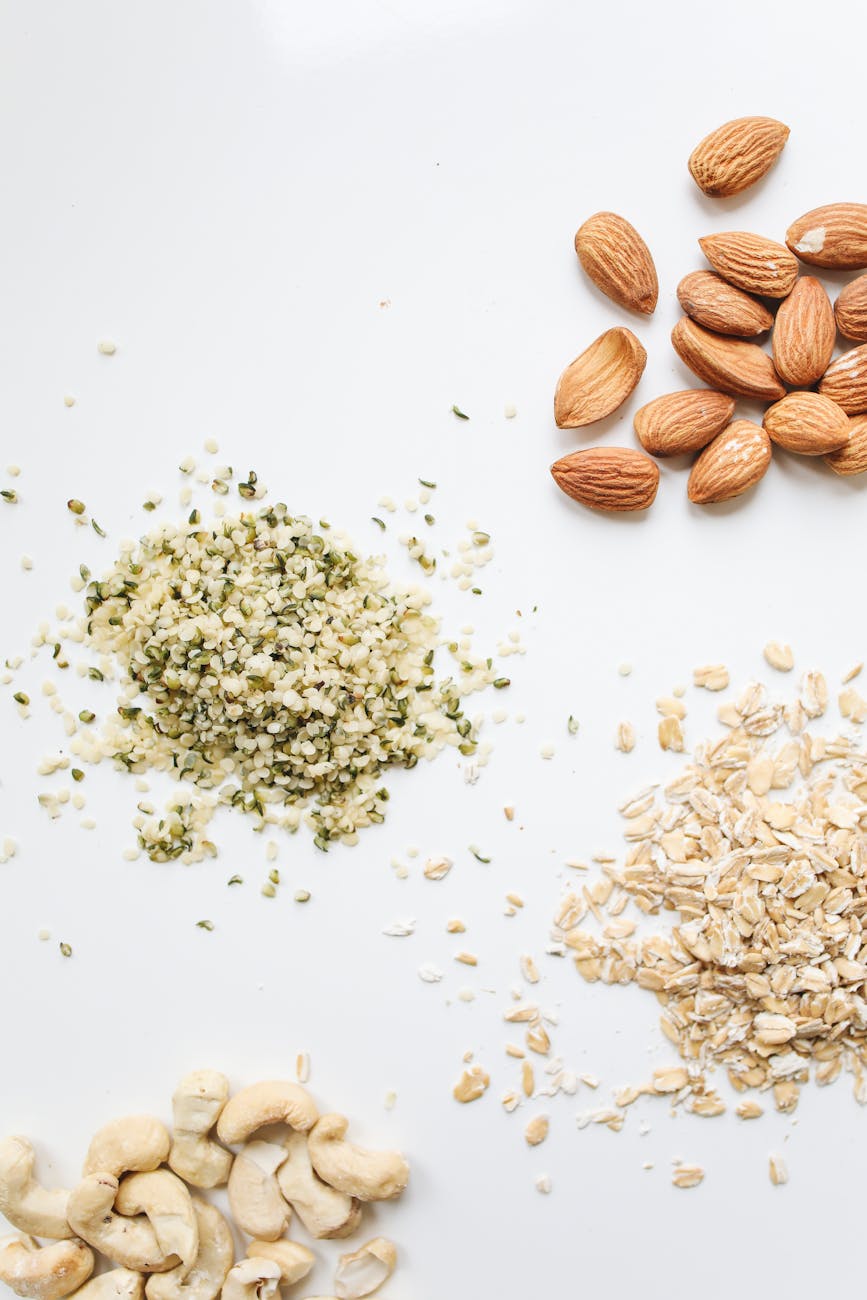This article will address monounsaturated fats and the scientific data supporting their benefits.
Olive oil, avocados, and certain nuts contain monounsaturated fats, which are considered good fats. These oils contain monounsaturated fatty acids (MUFAs), which may lessen the risk of heart disease and help you lose weight.
Monounsaturated fats, found in avocados, olives, and other nuts, have a variety of health benefits, such as losing weight, and can lower your risk of heart disease.
Your diet contains a variety of fats, each with its own chemical structure.
Unsaturated fats have a molecular structure that includes double bonds.
Monounsaturated fatty acids, or MUFAs, are one form of unsaturated fat. The term “mono,” which means one, refers to fats that have only one double bond.
There are various forms of MUFAs. Oleic acid is the most common kind, accounting for approximately 90% of those contained in the diet.
Palmitoleic acid and vaccenic acid are two other MUFAs.
Many foods are high in MUFAs, however the majority are made up of a variety of fats. There are very few foods with only one type of fat.
Olive oil, for example, contains a high concentration of MUFAs and other fats.
Unsaturated fat-rich foods, such as olive oil, are typically liquid at room temperature, but saturated fat-rich foods, such as butter and coconut oil, are frequently solid.

These various fats have distinct effects on health and disease. Monounsaturated fats, in particular, have been found to have a variety of health benefits.
Monounsaturated fats feature one double bond in their chemical composition and may provide health benefits.
Monounsaturated fats could help you lose weight
All fats give the same amount of energy (9 calories/gram), whereas carbohydrates and protein provide 4 calories/gram.
As a result, limiting the quantity of fat in your diet can help you lose weight by lowering your calorie consumption.
However, a diet rich in monounsaturated fats can also aid in weight loss, as long as you don’t consume more calories than you burn.
A couple of studies found that while calorie intake remained constant, diets high in MUFAs resulted in weight loss similar to low-fat diets.
For example, one study of 124 overweight or obese persons discovered that consuming either a high-MUFA diet (20% of total calories) or a high-carb diet for 1 year resulted in a weight loss of approximately 8.8 pounds (4 kg).
A larger study that incorporated the findings of 24 other trials discovered that high-MUFA diets are marginally more successful than high-carb diets for weight loss.
As a result, high-MUFA diets can be an efficient approach to lose weight when other calories are replaced rather than added.
Summary: High-MUFA diets may be more beneficial for weight loss than low-fat, high-carb diets.
They may help reduce the risk factors for heart disease
There is a heated controversy in nutrition over whether excessive saturated fats increase the risk of heart disease.
There is strong evidence that increasing your intake of MUFAs can lower your risk of heart disease, particularly if you replace saturated fat with them.
Too much cholesterol in the blood increases the risk of heart disease by clogging arteries and causing heart attacks or strokes. Several studies have indicated that a high intake of monounsaturated fats will lower blood cholesterol and triglycerides.
For example, one study of 162 healthy persons evaluated the effects of a three-month high-MUFA diet against a high-saturated fat diet on blood cholesterol levels.
According to this study, a high-saturated fat diet increased dangerous LDL cholesterol by 4%, whereas a high-MUFA diet decreased LDL cholesterol by 5%.
Other smaller trials have shown similar results, with MUFAs lowering LDL cholesterol while raising “good” HDL.
High-MUFA diets can also reduce blood pressure. A major research of 164 adults with high blood pressure discovered that a high-MUFA diet reduced blood pressure and the risk of heart disease when compared to a high-carb diet.
Similar improved blood pressure results have been observed in persons with type 2 diabetes and metabolic syndrome.

However, it is vital to remember that high-MUFA diets only have a positive impact when they substitute saturated fat or carbohydrates in the diet.
Furthermore, in each of these trials, the high-MUFA diets were part of calorie-controlled diets, implying that adding extra calories to your diet via high-MUFA foods may not have the same results.
Summary: High-MUFA diets can lower cholesterol, blood pressure, and heart disease risk factors, especially if they replace saturated fats.
They May Help Reduce Cancer Risk
There is also some evidence that MUFA-rich diets can help lessen the risk of some malignancies.
Prostate cancer, for example, is one of the most frequent cancers in males, particularly among the elderly.
Much research has looked into whether men who eat a lot of MUFAs have a lower or higher risk of prostate cancer, but the evidence is still ambiguous.
Each of the research looking into the function of high-MUFA diets in prostate cancer produced various results. Some have a protective impact, whereas others have no effect or are hazardous.
According to one of these studies, other components of high-MUFA meals, not the MUFAs themselves, may be responsible for the beneficial impact. As a result, the impact of MUFAs on prostate cancer remains unknown.
High-MUFA diets have also been investigated in relation to breast cancer risk.
One major research of 642 women discovered that individuals with the greatest levels of oleic acid (a form of MUFA found in olive oil) in their adipose tissue had the lowest risk of breast cancer.
However, this was only observed in women in Spain, where olive oil is frequently consumed, and not in women in other countries. This shows that there could be another component of olive oil that has a protective effect.
Several studies have looked specifically at olive oil and discovered that people who eat more olive oil have a lower risk of breast cancer.
Furthermore, all of these studies were observational, thus they cannot show cause and effect. Thus, other dietary and lifestyle factors may be contributing to this favorable effect.
Summary: Individuals with high MUFA intake have a decreased risk of breast cancer. However, this could be attributable to numerous meal components, not just MUFAs.
Monounsaturated fats could help improve insulin sensitivity
Insulin regulates blood sugar by transporting it from the bloodstream to your cells. The generation of insulin is critical for preventing excessive blood sugar and type 2 diabetes.
Studies have found that high-MUFA diets increase insulin sensitivity in both individuals with and without high blood sugar.
A study of 162 healthy participants discovered that consuming a high-MUFA diet for three months increased insulin sensitivity by 9%.
A similar, unrelated study of 472 persons with metabolic syndrome discovered that eating a high-MUFA diet for 12 weeks dramatically lowered insulin resistance.
Other studies have found that high-MUFA diets improve insulin and blood sugar management.
Summary: High-MUFA diets may improve insulin sensitivity and blood sugar control in both individuals with and without high blood sugar.
They May Reduce Inflammation
Inflammation can occur gradually and over time, contributing to chronic conditions such as obesity and heart disease.
High-MUFA diets, as opposed to high-saturated fat diets and Western diets, have the potential to reduce inflammation.
One study discovered that high-MUFA diets lowered inflammation in metabolic syndrome patients compared to high-saturated fat diets.
Other studies have found that people who follow a Mediterranean diet heavy in MUFAs have much-reduced levels of inflammatory molecules in their blood, such as CRP and IL-6.
High-MUFA diets can also lower the expression of inflammatory genes in adipose tissue when compared to high-saturated fat diets. This could be one of the ways in which MUFAs help with weight loss.
High-MUFA diets may lessen the risk of chronic diseases by lowering inflammation.
Summary: High-MUFA diets may lower inflammation, which can lead to chronic disease.

What foods contain these fats?
Plant-based foods are excellent sources of MUFAs. They can also be found in meat and other animal-derived foods.
In fact, some research indicates that plant-based sources of MUFAs, notably olive oil, are preferable to animal-based alternatives.
This could be attributed to the added beneficial components in olive oil.
The following is a list of foods high in MUFAs, along with the amount contained in 3.5 ounces (100 grams) of the food:
- Olive oil: 73.1 g
- Almonds: 33.6 g
- Cashews: 27.3 g
- Peanuts: 24.7 g.
- Pistachios: 24.2 g.
- Olives: 15 g
- Pumpkin seeds: 13.1 g.
- Pork: 10.7 g.
- Avocados: 9.8 g
- Sunflower seeds weigh 9.5 grams.
- Eggs: 4 grams.
Summary: MUFAs are present in both animal and plant-based foods. The best sources include olive oil, almonds, and seeds.
To Conclude on Benefits of Monounsaturated Fats
Monounsaturated fats are healthful fats found mostly in olive oil, nuts, seeds, and some animal-based meals.
Diets high in monounsaturated fats can aid in weight loss and may lower risk factors for heart disease, as long as they do not add unnecessary calories to your diet.
Foods high in MUFAs, particularly olive oil, may help lower cancer risk, inflammation, and insulin resistance.
Although it is vital to consume various types of fat, substituting bad fats with MUFAs can bring several health benefits.
